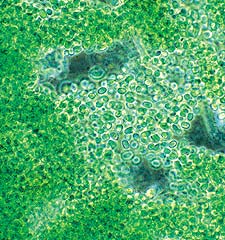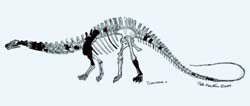Evidence is mounting that 251 million years ago, long before the dinosaurs dominated the Earth, a meteor the size of Mount Everest smashed into what is now northern Australia, heaving rock halfway around the globe, triggering mass volcanic eruptions, and wiping out all but about ten percent of the species on the planet. The “Great Dying,” as it’s called, was by far the most cataclysmic extinction event in Earth’s history, yet scientists have been unable to finger a culprit as they have with

New research shows that what was once considered a universal constant in oceanography could actually vary in the future – depending on the ecological scenarios that affect competition for resources among microscopic marine plants, which play a role in global climate.
The future of these plants, called phytoplankton, is important because they exist at the base of the marine food web and represent a large source of food for fish. Also, they affect global climate by using atmospheric carbon di
Up to 20 million homes in Europe could be powered by clean renewable energy from the sea, according to ocean energy expert Teresa Pontes of Portugal, who was speaking at the EurOCEAN marine science and policy event in Galway today (12th May). She estimated that, by harnessing energy from waves and marine currents, Europe would produce around 200 TerraWatt (200 million megawatt) hours per year of electrical power.
“The oceans contain a huge energy resource with different origins,” said Ms. Te
’Hyperactive’ antifreeze protein has eluded researchers for more than 30 years
A surprising discovery by Queen’s researchers helps explain why fish swimming in icy sea water don’t freeze.
The team, led by Biochemistry Professor Peter Davies, has identified a new “antifreeze” protein found in the blood of winter flounder enabling the fish to withstand temperatures as low as -1.9 degrees Celsius: the freezing point of sea water. The antifreeze plasma protei

Through the cycads and gingkoes of the floodplains, not far from the Sundance Sea, strode the 50-foot-long Suuwassea, a plant-eating dinosaur with a whip-like tail and an anomalous second hole in its skull destined to puzzle paleontologists in 150 million years. According to researchers at the University of Pennsylvania, Suuwassea emilieae (pronounced SOO-oo-WAH-see-uh eh-MEE-LEE-aye) is a smaller relative of Diplodocus and Apatosaurus and is the first named sauropod dinosaur from the Jurassic of s
Scientists will soon be extracting the deepest Arctic sedimentary cores ever drilled from the Lomonosov Ridge, in the deep oceans more than 2,000 km off the coast of Norway. They will core to a depth of about 500 metres under the seabed. From studying these cores the researchers expect to answer questions such as ’what caused the ice-age?’ So far the deepest oceanic sediment core extracted from the Arctic is only from a depth of 16 metres.
Seafloor sediments conceal a rich history